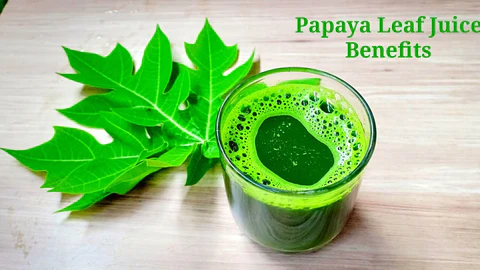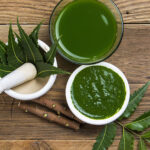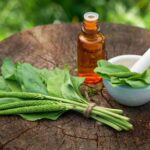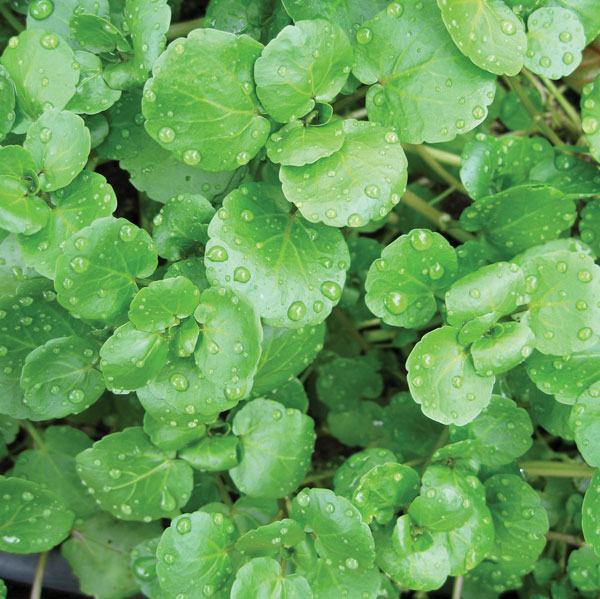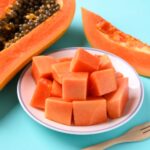Amazing Papaya Leaves Benefits
Papaya leaves benefits are quite enormous and special because they contain specific natural substances that have shown promise in various studies using animals and laboratory tests.
Even though there haven’t been numerous studies involving people, many products made from papaya leaves, like teas, extracts, pills, and juices, are popularly used to help with health issues and to improve overall well-being. This article aims to provide more detailed information about how papaya leaves can affect health.
Carica papaya, commonly known as papaya or pawpaw, is a fruit that comes from tropical regions like Mexico and parts of South America. Today, papaya is grown in many places around the world and is considered one of the most popular fruits globally.
People use not only the fruit but also the seeds and leaves of the papaya plant in cooking and traditional medicine. Even though there haven’t been a lot of studies involving humans, various preparations made from papaya leaves have been used for a long time to help treat illnesses and support good health.
List of Pawpaw Leaves Benefits
Papaya leaves are commonly consumed as extracts, teas, or juices and are believed to offer various health benefits. They have traditionally been used to manage symptoms of dengue fever and may assist in increasing platelet count and reducing fever.
Additionally, due to their rich bioactive compounds, papaya leaves are thought to have anti-inflammatory properties, potentially reducing inflammation and easing conditions like arthritis and joint pain.
Preliminary research also suggests that papaya leaf extract might help regulate blood sugar levels, improve insulin sensitivity, and support healthy skin and hair due to their antioxidant-rich profile.
Some studies have even explored the potential anti-cancer properties of papaya leaf extract, showing promise in inhibiting certain cancer cell growth.
Fever Treatment
Papaya leaves have a notable medicinal benefit: they can help alleviate symptoms related to dengue fever. Dengue fever is a viral illness spread by mosquitoes that can give people flu-like symptoms. These symptoms include high fever, tiredness, headaches, nausea, vomiting, and a skin rash.
In severe cases, dengue fever can lead to a dangerous drop in the number of platelets in the blood. When platelet levels are low, there’s a higher risk of bleeding, which can be life-threatening if not treated promptly.
While there’s no specific cure for dengue fever, various treatments aim to manage its symptoms, and one such treatment involves using papaya leaves.
Research from three different studies involving hundreds of dengue patients found that taking papaya leaf extract helped significantly increase their platelet counts, which is a positive sign in managing the disease.
Additionally, using papaya leaf therapy comes with minimal side effects, making it a safer option compared to traditional treatments. Plus, it’s considered to be more affordable.
To Help Fight Diabetes
Papaya leaves are also commonly used in traditional Mexican medicine to help manage both type 1 and type 2 diabetes by regulating blood sugar levels. Some studies on diabetic rats have shown that papaya leaf extract has potent antioxidant properties and can effectively lower blood sugar levels.
This could be because papaya leaves may help shield the insulin-producing cells in the pancreas from damage and early death.

However, it’s essential to note that there isn’t enough scientific evidence to confirm whether papaya leaves can produce the same beneficial effects in humans. More comprehensive research is required to determine the effectiveness of papaya leaves in helping people control high blood sugar levels.
For Digestive Issues
Papaya leaf tea and extract are often turned to as natural remedies to help relieve digestive issues like bloating, gas, and heartburn. This is because papaya leaves are rich in fiber, which is essential for promoting good digestive health.
Additionally, they contain a special enzyme called papain. Papain is famous for its ability to break down large protein molecules into smaller, more digestible ones. In fact, it’s commonly used in cooking as a meat tenderizer.
A study showed that taking a papain supplement, which is derived from papaya fruit, helped alleviate digestive issues such as constipation and heartburn in people with irritable bowel syndrome (IBS).
However, it’s important to note that there isn’t specific scientific research focusing on the effectiveness of papaya leaves in treating digestive disorders. Most of the information supporting its digestive benefits comes from personal anecdotes and experiences.
Therefore, while some people may find relief from digestive discomfort by using papaya leaf products, there’s no guarantee that it will work for everyone or provide long-term improvement in digestive function.
To Fight Against Inflammation
Papaya leaf products are often used as natural remedies to address both internal and external inflammation issues. These can range from skin irritations and rashes to joint discomfort, conditions like rheumatoid arthritis, and general muscle pains.
The reason behind their potential anti-inflammatory benefits lies in the variety of beneficial nutrients and compounds found in papaya leaves, including papain, flavonoids, and vitamin E.
A study conducted on rats showed promising results, indicating that papaya leaf extract could notably reduce inflammation and swelling, especially in the feet of rats suffering from arthritis. However, it’s crucial to note that this positive outcome hasn’t been replicated in human studies.
As of now, the available scientific evidence isn’t sufficient to conclusively state that papaya leaves can effectively treat acute or chronic inflammation in humans. While there are indications from animal studies and traditional usage, more research is needed to validate these potential anti-inflammatory effects in humans.
Support Hair Growth
Papaya leaves are sometimes recommended for enhancing hair growth and improving scalp health when used in topical masks or as a juice.
However, there isn’t strong scientific evidence to fully support these claims. Some research suggests that oxidative stress, caused by an imbalance of antioxidants in the body, can contribute to hair loss. Foods rich in antioxidants, like papaya leaves which contain flavonoids and vitamin E, might help reduce oxidative stress and potentially support hair growth.
Advocates for using papaya leaves for hair health often highlight its antioxidant-rich nature. Despite these claims, there’s a lack of substantial scientific proof that directly links the application of papaya leaves to improved hair growth.
Dandruff can sometimes be caused by an overgrowth of a fungus called Malassezia, which can impede hair growth. While papaya leaves have shown anti-fungal properties in laboratory studies, they haven’t been specifically tested against Malassezia.
As a result, it’s uncertain whether using papaya leaves can effectively combat the fungus that causes dandruff or offer significant benefits for hair and scalp health.
For Skin Health
Papaya leaves are often used to support skin health, both when consumed orally and when applied directly to the skin. One of the key components in papaya leaves is an enzyme called papain.
This enzyme has exfoliating properties, which means it can help remove dead skin cells when applied topically. By doing so, papain may help reduce the appearance of clogged pores, ingrown hairs, and acne, giving the skin a clearer and smoother look.
Additionally, the enzymes found in papaya leaves have been explored for their potential benefits in wound healing. Some studies, including one involving rabbits, have suggested that these enzymes can aid in wound healing and even minimize the formation of calluses.
While these findings are promising, it’s important to note that more research is needed to fully understand the effectiveness of papaya leaves in promoting overall skin health and treating specific skin conditions in humans.
Help Fight Against Cancer
Papaya leaves have been traditionally used in some cultures for their potential anti-cancer properties. However, it’s important to note that there’s a lack of comprehensive modern studies to support these claims.
In laboratory studies using test tubes, papaya leaf extract has demonstrated strong inhibitory effects on the growth of prostate and breast cancer cells. While these initial findings are promising, it’s crucial to understand that results from test-tube studies don’t always translate to the same outcomes in animal or human studies.
As of now, there hasn’t been consistent evidence from animal or human trials to confirm the anti-cancer benefits of papaya leaves.
While consuming papaya leaves and other antioxidant-rich foods may have potential benefits in cancer prevention due to their antioxidant properties, they should not be considered as a standalone treatment or cure for cancer without further scientific validation.
Using The Leaves Safely
Papaya leaves have been traditionally used for various health benefits, but it’s essential to approach their consumption with caution and awareness.
Safety Profile of Papaya Leaves:
- Studies, including a 2014 animal study, have shown that papaya leaves are generally safe, even at high doses, with no toxic effects.
- Human studies have also reported minimal negative side effects associated with papaya leaf consumption.
Potential Allergies and Precautions:
- Some individuals may be allergic to papaya leaves. If you experience any allergic reactions, it’s advisable to avoid consuming papaya leaves in any form.
- Pregnant or breastfeeding women should consult their healthcare provider before using any papaya leaf products to ensure safety for both mother and baby.
Choosing Quality Supplements:
- When purchasing papaya leaf supplements, opt for products that have been tested for purity by reputable third-party organizations, like the United States Pharmacopeia. This helps ensure the product does not contain contaminants or undisclosed harmful ingredients.
- Remember, nutritional and herbal supplements are not always rigorously regulated, especially in countries like the United States. Hence, being an informed consumer is crucial to avoid potential risks.
Dosage Guidelines:
- While precise dosing recommendations for papaya leaves are not yet established due to limited research, a safe and effective dosage for treating dengue symptoms is taking up to 30ml of papaya leaf extract spread across three doses per day.
- If you’re unsure about the appropriate dosage for your specific needs or condition, it’s best to consult a qualified healthcare provider for personalized advice.
Conclusion
Papaya, with its fruit, seeds, and leaves, is a widely cultivated plant used in various culinary and traditional medicinal practices worldwide.
While papaya leaves are commonly consumed in extract, tea, or juice form and have been associated with potential health benefits like treating dengue symptoms, reducing inflammation, managing blood sugar levels, supporting skin and hair health, and even cancer prevention, the scientific evidence supporting these claims is limited.
In summary, while papaya leaves are generally considered safe for most people, it’s crucial to exercise caution, be aware of potential allergies, choose high-quality supplements, and consult with a healthcare professional before incorporating papaya leaf products into your health and wellness routine.

A graduate of Computer Science and Information Management Technology. Diploma – Caregiving, Certificates – Dementia and Diabetes Awareness and Management. A researcher, blogger, songwriter, singer and acoustic guitarist. Born in an environment where natural talents such as healing are imparted at our natural birth. This natural talents of healing is the result of our genetic inheritance and the training from family environment.

